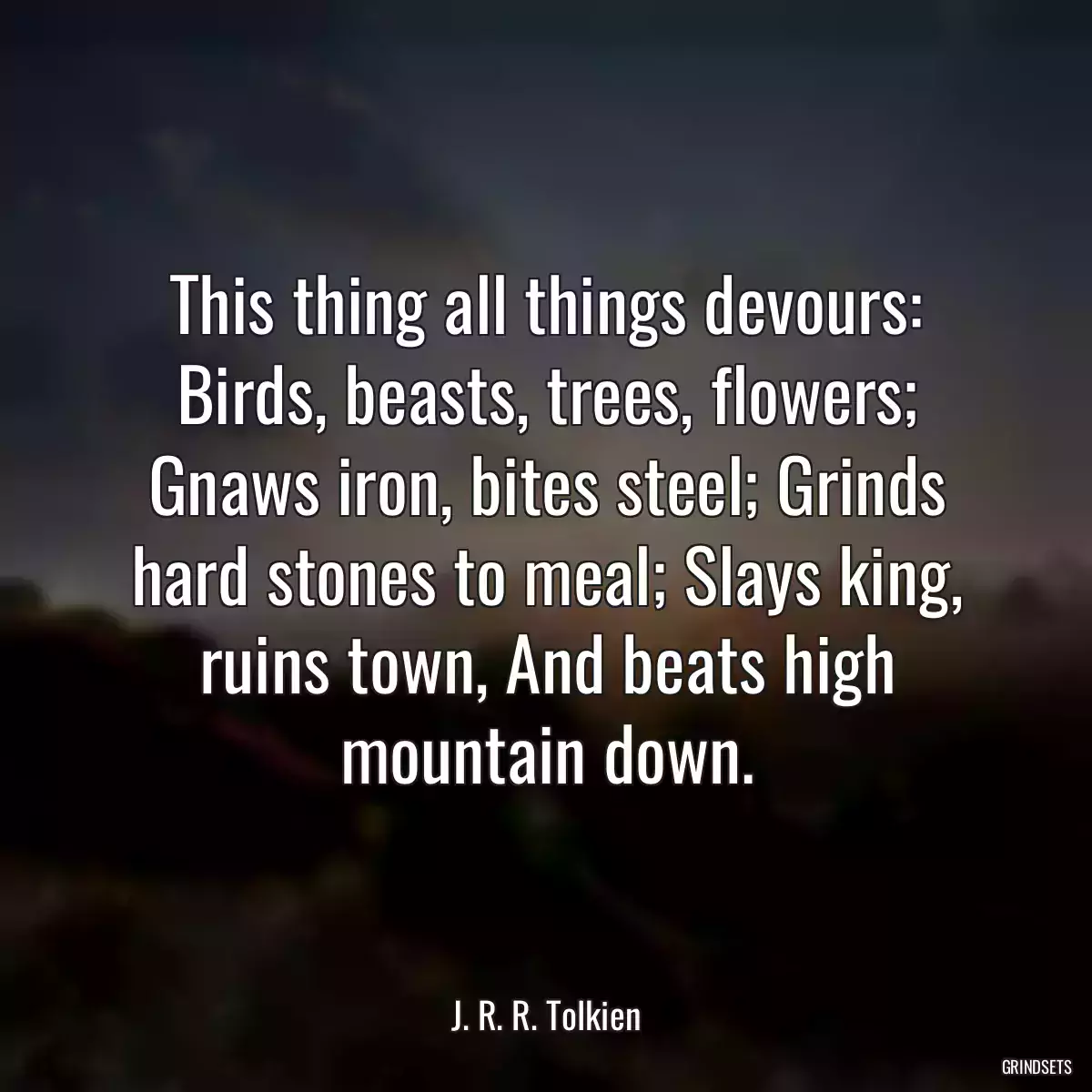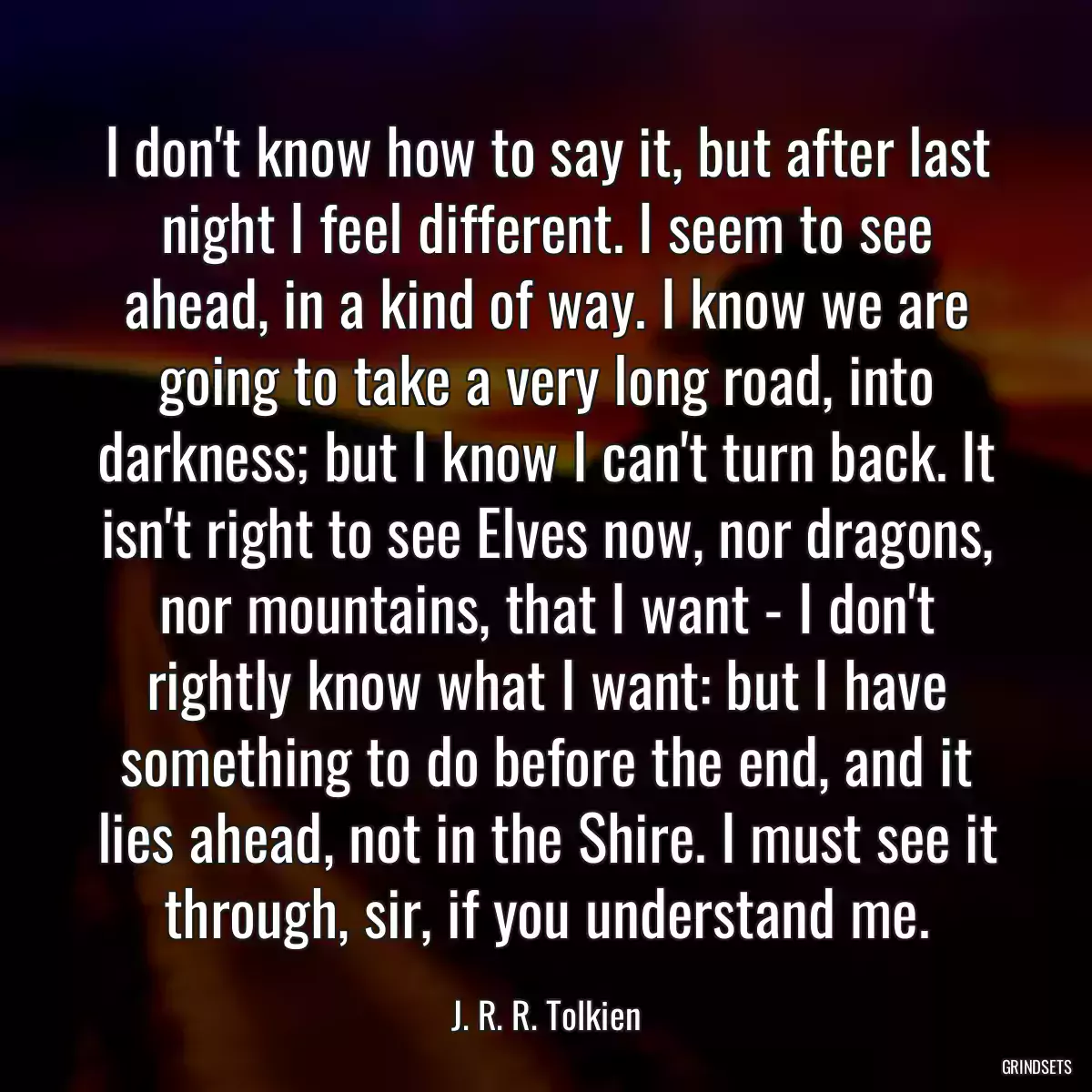
Quotes J. R. R. Tolkien - page 3
Find dozens of J. R. R. Tolkien with images to copy and share.

The King beneath the mountains, The King of carven stone, The lord of silver fountains Shall come into his own! His crown shall be upholden, His harp shall be restrung, His halls shall echo golden To songs of yore re-sung. The woods shall wave on mountains. And grass beneath the sun; His wealth shall flow in fountains And the rivers golden run. The streams shall run in gladness, The lakes shall shine and burn, And sorrow fail and sadness At the Mountain-king’s return!
Gil-galad was an Elven-king. Of him the harpers sadly sing: the last whose realm was fair and free between the Mountains and the Sea. His sword was long, his lance was keen, his shining helm afar was seen; the countless stars of heaven's field were mirrored in his silver shield. But long ago he rode away, and where he dwelleth none can say; for into darkness fell his star in Mordor where the shadows are.
Far over misty mountains cold To dungeons deep and caverns old We must away, ere break of day, To find our long-forgotten gold.
You may also like
And now at last it comes. You will give me the Ring freely! In place of the Dark Lord you will set up a Queen. And I shall not be dark, but beautiful and terrible as the Morning and the Night! Fair as the Sea and the Sun and the Snow upon the Mountain! Dreadful as the Storm and the Lightning! Stronger than the foundations of the earth. All shall love me and despair!
I threw down my enemy, and he fell from the high place and broke the mountain-side where he smote it in his ruin.
He loved mountains, or he had loved the thought of them marching on the edge of stories brought from far away; but now he was borne down by the insupportable weight of Middle-earth. He longed to shut out the immensity in a quiet room by a fire.
Roads go ever ever on, Over rock and under tree, By caves where never sun has shone, By streams that never find the sea; Over snow by winter sown, And through the merry flowers of June, Over grass and over stone, And under mountains of the moon. Roads go ever ever on Under cloud and under star, Yet feet that wandering have gone Turn at last to home afar. Eyes that fire and sword have seen And horror in the halls of stone Look at last on meadows green And trees and hills they long have known
Far over the Misty Mountains cold, To dungeons deep and caverns old, We must away, ere break of day, To seek our pale enchanted gold. The dwarves of yore made mighty spells, While hammers fell like ringing bells, In places deep, where dark things sleep, In hollow halls beneath the fells. The pines were roaring on the heights, The wind was moaning in the night, The fire was red, it flaming spread, The trees like torches blazed with light.

I don't know how to say it, but after last night I feel different. I seem to see ahead, in a kind of way. I know we are going to take a very long road, into darkness; but I know I can't turn back. It isn't right to see Elves now, nor dragons, nor mountains, that I want - I don't rightly know what I want: but I have something to do before the end, and it lies ahead, not in the Shire. I must see it through, sir, if you understand me.
Great engines crawled across the field; and in the midst was a huge ram, great as a forest-tree a hundred feet in length, swinging on mighty chains. Long had it been forging in the dark smithies of Mordor, and its hideous head, founded of black steel, was shaped in the likeness of a ravening wolf; on it spells of ruin lay. Grond they named it, in memory of the Hammer of the Underworld of old. Great beasts drew it, orcs surrounded it, and behind walked mountain-trolls to wield it.
Some sang too that Thror and Thrain would come back one day and gold would flow in rivers, through the mountain-gates, and all that land would be filled with new song and new laughter. But this pleasant legend did not much affect their daily business.
Farewell we call to hearth and hall! Though wind may blow and rain may fall. We must away ere the break of day. Far over wood and mountain tall.
For the rest, they shall represent the other Free Peoples of the World: Elves, Dwarves, and Men, Legolas shall be for the Elves; and Gimli son of Gloin for the Dwarves. They are willing to go at least to the passes of the Mountains, and maybe beyond. For Men you shall have Aragorn son of Arathorn, for the Ring of Isildur concerns him closely.
Eastward the dawn rose, ridge behind ridge into the morning, and vanished out of eyesight into guess; it was no more than a glimmer blending with the hem of the sky, but it spoke to them, out of the memory and old tales, of the high and distant mountains.
What really happens is that the story-maker proves a successful 'sub-creator'. He makes a Secondary World which your mind can enter. Inside it, what he relates is 'true': it accords with the laws of that world. You therefore believe it, while you are, as it were, inside. The moment disbelief arises, the spell is broken; the magic, or rather art, has failed. You are then out in the Primary World again, looking at the little abortive Secondary World from outside.
Shall we mourn here deedless forever a shadow-folk mist-haunting dropping vain tears in the thankless sea
And when [Bëor] lay dead, of no wound or grief, but stricken by age, the Eldar saw for the first time the swift waning of the life of Men, and the death of weariness which they knew not in themselves; and they grieved greatly for the loss of their friends. But Bëor at the last had relinquished his life willingly and passed in peace; and the Eldar wondered much at the strange fate of Men, for in all their lore there was no account of it, and its end was hidden from them.
You may also like

Many that live deserve death. And some that die deserve life. Can you give it to them? Then do not be too eager to deal out death in judgement. For even the very wise cannot see all ends.